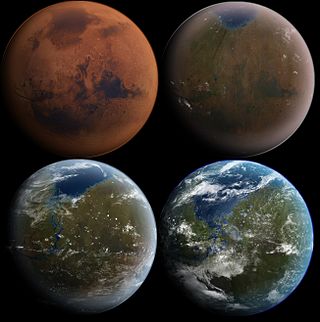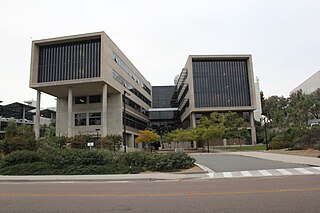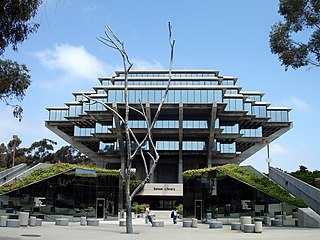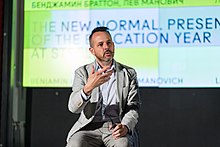
Terraforming or terraformation ("Earth-shaping") is the hypothetical process of deliberately modifying the atmosphere, temperature, surface topography or ecology of a planet, moon, or other body to be similar to the environment of Earth to make it habitable for humans to live on.

The Antikythera mechanism is an Ancient Greek hand-powered orrery, described as the oldest known example of an analogue computer used to predict astronomical positions and eclipses decades in advance. It could also be used to track the four-year cycle of athletic games similar to an Olympiad, the cycle of the ancient Olympic Games.

The Scripps Institution of Oceanography is the center for oceanography and Earth science based at the University of California, San Diego in La Jolla, California.

The San Diego Supercomputer Center (SDSC) is an organized research unit of the University of California, San Diego (UCSD). SDSC is located at the UCSD campus' Eleanor Roosevelt College east end, immediately north the Hopkins Parking Structure.
This is an alphabetical list of articles pertaining specifically to software engineering.

Geisel Library is the main library building of the University of California, San Diego. It is named in honor of Audrey and Theodor Seuss Geisel, better known as children's author Dr. Seuss. The building's distinctive architecture, described as occupying "a fascinating nexus between brutalism and futurism", has resulted in its being featured in the UC San Diego logo and becoming the most recognizable building on campus.

Beatriz Colomina is an architecture historian, theorist and curator. She is the founding director of the Program in Media and Modernity at Princeton University, the Howard Crosby Butler Professor of the History of Architecture and director of graduate studies in the School of Architecture.

Casey Edwin Barker Reas, also known as C. E. B. Reas or Casey Reas, is an American artist whose conceptual, procedural and minimal artworks explore ideas through the contemporary lens of software. Reas is perhaps best known for having created, with Ben Fry, the Processing programming language.

Nicolas Berggruen is a US-based billionaire investor and philanthropist. Born in Paris, France, he is a dual German and American citizen. He is the founder and president of Berggruen Holdings, a private investment company and the co-founder and chairman of the Berggruen Institute, a non-profit, non-partisan think tank that works to address global governance issues. In 2014, through the Institute, Berggruen launched Noema Magazine, formerly the WorldPost, a digital and print publication dedicated to exploring global issues.
Eric Baković is an American linguist who is a professor in the Department of Linguistics at the University of California, San Diego with a specialization in phonology. He is also affiliated with the Center for Research on Language (CRL), the Interdisciplinary Program in Cognitive Science, Computational Social Science, and Latin American Studies. He earned his BA in 1993 in linguistics from the University of California, Santa Cruz and completed his PhD under the supervision of Alan Prince at Rutgers in 2000.

The Berggruen Institute is a Los Angeles-based think tank founded by Nicolas Berggruen.

Strelka Institute for Media, Architecture and Design is a non-profit international educational project, founded in 2009 and located in Moscow. Strelka incorporates an education programme on urbanism and urban development aimed at professionals with a higher education, a public summer programme, the Strelka Press publishing house, and KB Strelka, the consulting arm of the Institute. Strelka has been listed among the top-100 best architecture schools in 2014, according to Domus magazine.

Nathan Gardels is the editor-in-chief of Noema Magazine. He is also the co-founder of and a senior adviser to the Berggruen Institute. He previously served as editor-in-chief of The WorldPost, a partnership with The Washington Post, as well as editor-in-chief of Global Viewpoint Network and Nobel Laureates Plus, both services of the Los Angeles Times Syndicate/Tribune Media). From 1985 to 2014 he also was editor of New Perspectives Quarterly, the journal of social and political thought published by Blackwell/Oxford.

Sascha Pohflepp was a German artist, designer, and writer whose work focused on the role of technology’s influence on the environment, often collaborating with scientists and other artists to explore this theme.

Tiziana Terranova is an Italian theorist and activist whose work focuses on the effects of information technology on society through concepts such as digital labor and commons. Terranova has published the monograph Network Culture. Politics for the Information Age, as well as a more extensive number of essays and speeches, and appeared as a keynote speaker in several conferences. She lectures on the digital media cultures and politics in the Department of Human and Social Sciences, at the University of Naples, 'L'Orientale'.
Jim Agler is a mathematician who is an emeritus professor at the University of California, San Diego. He is a fellow of the American Mathematical Society since 2016, for "contributions to operator theory and the theory of analytic functions of several complex variables".
Lisa Welp is a biogeochemist who utilizes stable isotopes to understand how water and carbon dioxide are exchanged between the land and atmosphere. She is a professor at Purdue University in the department of Earth, Atmosphere, and Planetary Sciences.
K. Wayne Yang is a professor and scholar of community organizing, critical pedagogy, and Indigenous and decolonizing studies. He is a professor of ethnic studies at the University of California, San Diego and Provost of John Muir College. He writes about decolonization and everyday epic organizing, often with his frequent collaborator, Eve Tuck. Currently, they are convening The Land Relationships Super Collective, editing the book series, Indigenous and Decolonizing Studies in Education, and editing the journal, Critical Ethnic Studies. He is interested in the complex role of cities in global affairs: cities as sites of settler colonialism, as stages for empire, as places of resettlement and gentrification, and as always-already on Indigenous lands.
"The stack" is a term used in science and technology studies, the philosophy of technology and media studies to describe the multiple interconnected layers that computation depends on at a planetary scale. The term was introduced by Benjamin H. Bratton in a 2014 essay and expanded upon in his 2016 book The Stack: On Software and Sovereignty, and has been adapted, critiqued and expanded upon by numerous other scholars.














